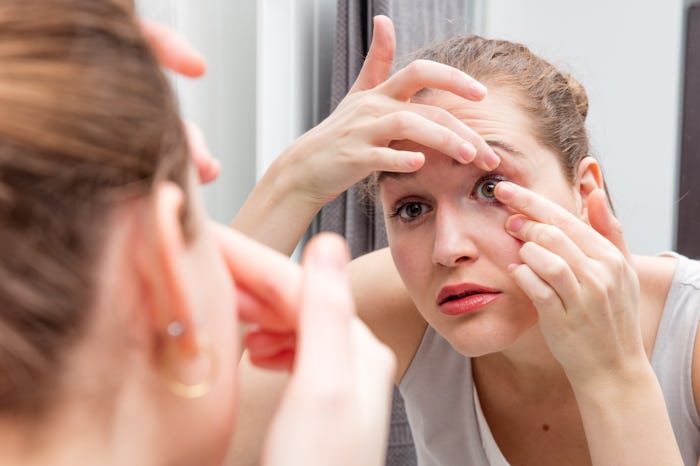Life

7 Surprising Times You Shouldn’t Wear Contacts
Contact lenses are an easy and popular alternative to glasses, but they do require some caution here and there. In fact, there even are a few surprising times you shouldn't wear contacts. Of course, considering the fact that they're literally stuck to your eyeballs for hours at a time, it only makes sense to approach contact lenses with care.
"More than 45 million Americans of all ages (more than one in ten people) wear contact lenses — a safe and effective form of vision correction," Barbara Horn, O.D., president of the American Optometric Association Board, tells Romper.
"However, more than 40 percent of contact lens wearers do not follow the proper hygiene instructions for their lenses, which can pose serious risks to eye and vision health. While contact lenses provide many vision benefits, they are not risk free." Erring on the side of caution and hygiene is probably a great idea any time the sensitive eye area is concerned.
If you have any specific questions about contact lens safety, cleanliness, and care, then don't hesitate to reach out to your eye doctor at once. For the most part, though, it's best to take care when you're doing anything that can be harmful to contact lenses.
1While showering or bathing
For the most part, it's crucial to keep your contacts away from any and all water.
"This is because water increases the risk of bacteria, fungi, and parasites getting in our eyes and contaminating contact lenses. This can lead to serious eye infections," says Thomas Steinemann, MD, clinical spokesperson for the American Academy of Ophthalmology.
Although tap water may seem harmless, it could contain an amoeba called Acanthamoeba, which can cause a severe eye infection, as Dr. Steinmann further explains. This infection can result in the need for corneal transplant, and it may even cause blindness. (Thankfully, this particular infection is rather rare.) Still, the potential for germs in any water means it's best to remove contacts before showering or bathing.
2When biking
In general, contact users should wear protective glasses or goggles when riding a bicycle, according to the University of Iowa Hospitals & Clinics. Dust or dirt from the road can easily get stuck in your contact lenses.
Consider using a pair of protective sunglasses to shield your contacts, or even spring for some prescription cycling glasses to see the road clearly while sparing your contacts altogether, according to VeloNews. (The Rudy Project Sintryx shades, with their wraparound style, do look pretty cool.)
3In hot tubs
Yep, even the most relaxing place in the world isn't a great place for contact lenses.
"Another water-loving bacteria is pseudomonas, which is often found in hot tubs and swimming pools," says Dr. Steinemann.
Although infections from pseudomonas are generally mild, people who wear contact lenses have reported eye infections from them, according to the Centers for Disease Control and Prevention. For the most part, it's safest to remove contacts before hopping in the hot tub.
4For extra-long days
If you're active from the break of dawn until late at night, don't expect your poor contact lenses (and eyeballs) to keep up with that pace.
"Have a regular schedule where you take your lenses out and let your eyes rest," Scott MacRae, M.D., professor of opthalmology and visual science at the University of Rochester, told Cosmopolitan. These breaks can let your eyes get oxygen, as well as help prevent bacterial buildup. If you have a super long day on tap, then consider taking your contacts out after a few hours and switching to glasses, as suggested in PerfectLensWorld.
5While swimming
OK, so by this point it probably goes without saying that swimming in contacts is not such a great idea. Wearing contact lenses at any point when water can get in your eyes is a bad idea, according to Dr. Steinemann.
If you still want to see clearly at the beach or pool, there are a lot of other alternatives. Prescription sunglasses are always an option, and prescription or optical swim goggles have gotten a lot more affordable in recent years, as noted in Your Swim Book. (They start at $15, instead of $200 for custom-made prescription swim goggles.)
6When sleeping
Even when you're totally wiped out, it's best to remove contact lenses before calling it a night.
"Sleeping in contact lenses increases the risk of an eye infection and can cause permanent eye damage," says Dr. Horn.
"Debris can get trapped underneath the contact lenses and, while being worn under a closed eye for several hours or even just a few minutes, can cause a small abrasion which can then become infected, potentially causing a corneal ulcer that can lead to scarring on the eye, permanently impaired vision or even the loss of your eye." Yep, those are all great reasons to take out contacts before sleep.
7Around dust areas
If you're going to paw around an old antique store or sand down wooden floors for the afternoon, consider your contacts first.
"Wearing contact lenses in very dusty places should be avoided as well because of the potential risk for eye infection," says Dr. Steinemann. Pop out your contacts beforehand or use protective eye wear.
Most of the time, your regular choice of corrective eye wear should not cause problems. Contacts are a popular choice for many people, and by avoiding activities that kick up dust or water, both your contact lenses and eyeballs will be much happier.